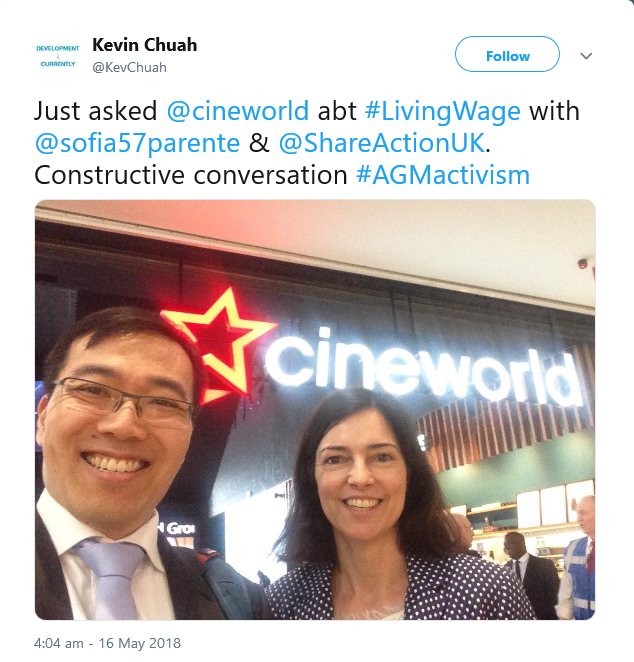The ShareAction CEO tells Oliver Balch how the successful shareholder campaign against Shell shows the power of investors to make the world safer for people and planet
Shell is currently riding high on a wave of popular (green) sentiment. To widespread acclaim, the Anglo-Dutch oil major announced just after Christmas that it would consider doubling its projected investment in green energy to $4bn a year after 2020, up from the $1-2bn it has committed to spend in each of the next two years.
In an interview with The Guardian, Shell’s chief executive Maarten Wetselaar said he would push for more investment in green energy, post 2020, if initial projects provided high enough returns.
Catherine Howarth, who is CEO of the responsible investment charity ShareAction, read the article with quiet satisfaction.
"ShareAction is one of a group of NGOs that filed a resolution, which went to the vote at the May 2018 AGM, asking Shell to set targets aligned with the goals of the Paris Agreement," she says. "“We were pleased when Shell took steps towards this commitment in December. Major investors in the company ran with this demand and deserve enormous credit for getting it over the line. It puts Shell well ahead of the rest of the oil and gas sector globally, even though its targets are not 100% Paris-compliant."
It is one of many victories – both large and small – that the UK-based charity has chalked up since Howarth took the helm a decade ago. Other recent examples include: assisting disability rights campaigners to persuade transport firm National Express to make its trains and coaches more accessible; helping persuade banks such as Lloyds, RBS and Standard Chartered to quit financing new coal projects; and leading the fight to persuade FTSE100 companies to pay a living wage (a policy one third of them now follow).

The most significant achievement under Howarth’s watch, however, relates to recent changes to disclosure requirements for pension trustees. Under new regulations that come into force this October, all UK pension fund trustees will need to publicly demonstrate how they are factoring environmental, social and governance (ESG) factors into their investment decisions.
“This is a huge step forward. It will force the [pension] industry to embrace the need for environmental and social risk management in the investment process,” Howarth states.
Not a bad record for an organisation with only 50 or so staff. Set up in 2006, ShareAction makes up for what it lacks in size and resources with the clarity of its mission. To quote its own rhetoric, the London-based non-profit exists to “make investment a force for good”.
But what exactly does that mean? And, more importantly, how does this disruptive charity intend to bring about such a vision?
We’re not anti the investment system nor companies, which are incredibly important and enhance our quality of life
According to Howarth, for an investment system to act as a force for good, it needs to be one that genuinely serves savers and communities, keeps the planet for getting trashed, and is open to all.
The ‘how?’ of such a vision is far trickier to resolve. The sheer size of the investment sector is enough to quell most into silence. The private equity industry, though relatively new, controls over $3trn assets under management. As for pension funds, they clock up assets worth more than 10 times this. Meanwhile, the largest five US banks alone boast combined securities trading portfolios in the region of $1.5trn.
When Howarth thinks about the gargantuan size of the global investment system, however, she thinks less of impossibly deep vaults and more of potentially world-changing influence.
“The decisions made by professional investors affect all of our lives,” she says. “We’re not anti the investment system nor companies, which are incredibly important and enhance our quality of life.”

Her disruptive vision for the world of investment is based on a three-part theory of change that is cogently thought-out, clearly articulated and – most impressively of all – well-evidenced in practice.
ShareAction’s entire focus is set on building a movement for responsible investment. Other interest groups will have different end points in mind. But all will testify to the value of getting people behind a cause, building momentum, and shouting with one voice.
The investment industry operates in a very exclusive, elitist, jargon-heavy way that most people find really alienating
For Howarth, a vital starting point is connecting the world of finance with the wider public. Investing is for everyone, not just the elite, she says: “Yet the investment industry operates in a very exclusive, elitist, jargon-heavy way that most people find really alienating.”
In order to “demystify” the process the charity offers educational materials and resources, as well as free training for those wishing to exercise their voting rights as shareholders.
ShareAction provides advice, for instance, on how individuals with small shareholdings can table a query for pension trustees or company management. It also supports shareholders in making the most effective use of companies’ annual general meetings to voice their concerns.
Howarth is a big fan of then spreading the word of shareholder interventions on social media, describing platforms such as Facebook and Twitter as “amazingly valuable”. Seeing or hearing about how everyday citizens “go face-to-face” with the leaders of some of the world’s largest companies is hugely motivating for others, she argues.

She is keen to clarify, however, that ShareAction’s style is “very non-aggressive”: “We often get positive feedback from the [targeted] companies themselves. And there are always people within the companies that are quietly championing these issues, so when someone brings up an issue at an AGM it often gets catapulted up the agenda.”
Aiding ShareAction’s movement-creation efforts are recent reforms to the pension system in the UK. As of February last year, all UK employees were automatically enrolled onto their company’s workplace pension scheme. Public participation in the pension market has boomed as a result.
Howarth’s other two change-making strategies focus on the internal workings of the investment system. A large piece of the puzzle here relates to incentives. Investors and asset managers aren’t inherently bad people (barring a few exceptions, as in any profession), but they are creatures of a system. And if that system is pushing them to take a certain route, that’s the route they will take.
The way fiduciary duty has been interpreted has focused on maximising shareholder returns over the short-term
She points to the “narrow and unhelpful” way in which the fiduciary duty of asset managers (ie the duty to act in the sole interest of asset holders) has been historically understood.
“The way fiduciary duty has been interpreted has focused on maximising shareholder returns over the short-term. This dogma has often been really disappointing, certainly non-financially, but actually financially as well.”
Campaigning to rebalance investor incentives more towards the long-term takes up much of Howarth’s time. That said, she is wary about over-engineering market incentives, noting the propensity for such measures to prompt unintended consequences. Just consider share-based rewards for corporate directors, she says. Far from aligning the interests of directors and shareholders, she argues, the move has encouraged the former to chase high share prices at almost any cost.
Better to fix the rules that frame the system to ensure that unsustainable and unethical options are just taken off the table altogether. Only then will the real refuseniks within the investment community come on board, she argues.
 ShareAction has helped create campaigns around issues such as fair pay. (Credit: Twitter)
ShareAction has helped create campaigns around issues such as fair pay. (Credit: Twitter)
“Unfortunately, although there are some really enlightened and engaged pension funds that have very strong sustainability policies, there is a long tail of laggards that don’t . . . so we need to get laws and regulations changed to fit with the twenty-first century risks that exist, of which climate change is the most critical.”
Howarth’s final lever of change revolves around the potential of investors and asset managers to be “catalysts of positive change”. Under Howarth’s tenure, ShareAction has helped create investor-led campaigns on everything from fair pay to workforce risks through to corporate uptake of science-based emissions reduction targets and 100% renewable energy use. The charity is currently putting the pieces together for a new campaign around childhood obesity, focusing on investor concerns about the potential liabilities faced by food retailers and manufacturers.
From its Brussels office, ShareAction also helps co-ordinate the European Responsible Investment Network, which connects shareholder activist groups across the continent. It operates a similar network for charities and foundations that are looking to use their shareholdings to effect positive change.
While her decade at ShareAction has seen many positive developments, Howarth confesses to being dissatisfied with the overall pace of change.
Of all the things we do at ShareAction, the hardest thing is building a bigger, more participative movement
“We say we are dedicated to building a movement and I think we’ve done more than anyone else in the field to do that. But at the same time I’m dissatisfied with where we’ve got to. Of all the things we do at ShareAction, the hardest thing is building a bigger, more participative movement.”
Technology, she believes, could present a breakthrough here. She recently established an R&D lab within ShareAction to investigate how emerging digital and communications tools could potentially be used to promote public mobilisation.
Other sources of inspiration going forward include the United Nations’ Sustainable Development Goals. As a tangible and outcome-orientated template for action, she believes the UN’s list of 2030 objectives could be just the ticket to awaken investors to their role in today’s unfolding sustainability story.

Howarth believes the SDGs will help awaken investors to their role on sustainability.
“What I want to see us being involved in is a real stepping up of ambition to move impact thinking into the mainstream investment world,” Howarth says. “We’ve come a long way in 10 years . . . but we haven’t yet got a deep sense of responsibility in the investment industry of sharing the load of solving society’s greatest problems.”
Her final rallying call is for investors to look to the best of the corporate sector, where she sees “a lot to be borrowed” in terms of creative thinking and progressive action.
“I am very inspired by some of the movements going on in the corporate sector,” she concludes. “I think the B Corp movement is really, really interesting, for example. What we need are ‘B Investors’.”
Howarth has stuck doggedly to her goal of creating a movement for responsible investment for a decade. She has done so – and intends to keep doing so – with no expectation of public plaudits or acclaim. For this quietly determined disruptor, seeing the investment community gradually becoming a force of good is reward enough.
ShareAction's Catherine Howarth will be one of more than 150 speakers at the 18th annual Responsible Business Summit Europe 10-12 June in London.
CV: Catherine Howarth
Age: 44
Chief Executive, ShareAction
2008 – present
Trustee, Scott Trust
2015 – present
Young Global Leader, World Economic Forum
2014
Trustee, Green Alliance
2012-2016
Trustee, The Pensions Trust
2008-2012
Lead Organiser, West London Citizens
2000-2008
ShareAction CEO Catherine Howarth will be speaking at Ethical Corporation's 18th Responsible Business Summit Europe conference in London 10-12 June. She will join 600+ CEOs, investors and heads of business to share practical ideas on how business can take the lead and accelerate action on social and environmental issues.
Main picture credit: ShareAction
ShareAction #disruptors ethical investing ESG Shell Catherine Howarth pension funds the disruptors divestment movement living wage

